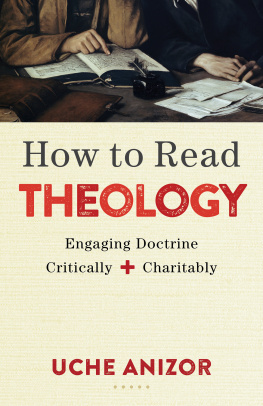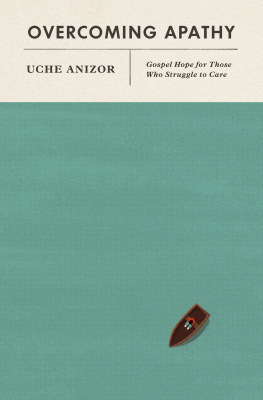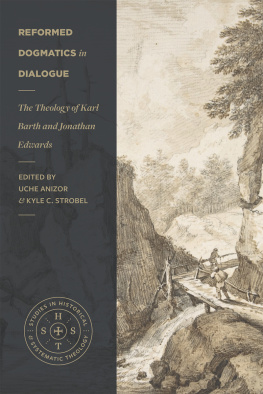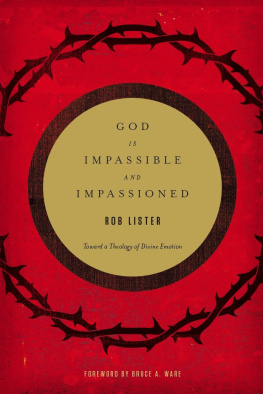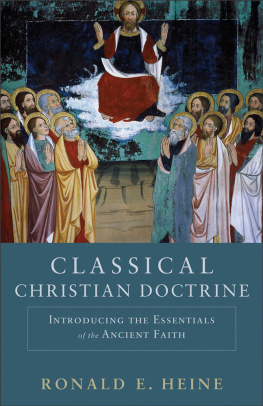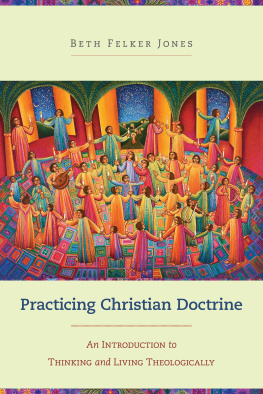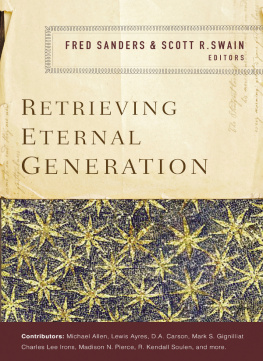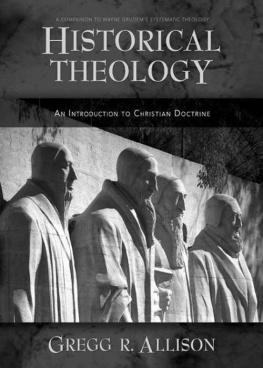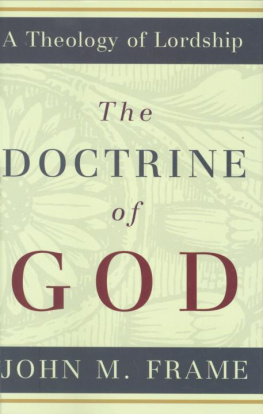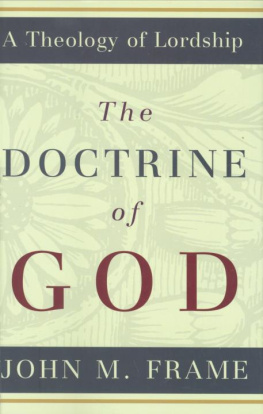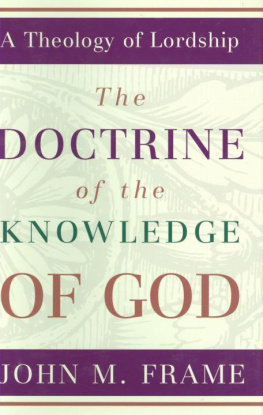Uche Anizor - How to Read Theology: Engaging Doctrine Critically and Charitably
Here you can read online Uche Anizor - How to Read Theology: Engaging Doctrine Critically and Charitably full text of the book (entire story) in english for free. Download pdf and epub, get meaning, cover and reviews about this ebook. year: 2018, publisher: Baker Publishing Group, genre: Religion. Description of the work, (preface) as well as reviews are available. Best literature library LitArk.com created for fans of good reading and offers a wide selection of genres:
Romance novel
Science fiction
Adventure
Detective
Science
History
Home and family
Prose
Art
Politics
Computer
Non-fiction
Religion
Business
Children
Humor
Choose a favorite category and find really read worthwhile books. Enjoy immersion in the world of imagination, feel the emotions of the characters or learn something new for yourself, make an fascinating discovery.
- Book:How to Read Theology: Engaging Doctrine Critically and Charitably
- Author:
- Publisher:Baker Publishing Group
- Genre:
- Year:2018
- Rating:4 / 5
- Favourites:Add to favourites
- Your mark:
- 80
- 1
- 2
- 3
- 4
- 5
How to Read Theology: Engaging Doctrine Critically and Charitably: summary, description and annotation
We offer to read an annotation, description, summary or preface (depends on what the author of the book "How to Read Theology: Engaging Doctrine Critically and Charitably" wrote himself). If you haven't found the necessary information about the book — write in the comments, we will try to find it.
Uche Anizor: author's other books
Who wrote How to Read Theology: Engaging Doctrine Critically and Charitably? Find out the surname, the name of the author of the book and a list of all author's works by series.
How to Read Theology: Engaging Doctrine Critically and Charitably — read online for free the complete book (whole text) full work
Below is the text of the book, divided by pages. System saving the place of the last page read, allows you to conveniently read the book "How to Read Theology: Engaging Doctrine Critically and Charitably" online for free, without having to search again every time where you left off. Put a bookmark, and you can go to the page where you finished reading at any time.
Font size:
Interval:
Bookmark:
2018 by Uche Anizor
Published by Baker Academic
a division of Baker Publishing Group
PO Box 6287, Grand Rapids, MI 49516-6287
www.bakeracademic.com
Ebook edition created 2018
All rights reserved. No part of this publication may be reproduced, stored in a retrieval system, or transmitted in any form or by any meansfor example, electronic, photocopy, recordingwithout the prior written permission of the publisher. The only exception is brief quotations in printed reviews.
Library of Congress Cataloging-in-Publication Data is on file at the Library of Congress, Washington, DC.
ISBN 978-1-4934-1432-1
Scripture quotations are from the Holy Bible, New International Version. NIV. Copyright 1973, 1978, 1984, 2011 by Biblica, Inc. Used by permission of Zondervan. All rights reserved worldwide. www.zondervan.com
To Dan Treier,
a model of the critical yet charitable reader
Cover
Title Page
Copyright Page
Dedication
List of Illustrations
Acknowledgments
Prologue: What Kind of Book Is This?
Part 1: On Reading Charitably
1. Enemies of Love: The Challenge of Reading Theology Charitably
2. Context, Context, Context: The Backstory of Theology
Part 2: On Reading Critically
3. The Bible Tells Me So: Theology and Scripture
4. Havent We Heard This Before? Theology and Tradition
5. Believing Possible Things: Theology and Reason
6 The Trial of Real Life: Theology and Experience
Epilogue: Practice Makes Perceptive
Index
Back Cover
Figure 3.1 How Scripture Authorizes a Theological Claim: Warfield
Figure 3.2 How Scripture Authorizes a Theological Claim: Tillich
Figure 3.3 Four Views of Scripture and Their Effect on Doing Theology
Figure 4.1 Theological Genres
Figure 4.2 Types of Tradition and Their Authority
Figure 5.1 The Interconnectedness of Doctrines
Several people contributed graciously to this project, which is better because of them. A special thanks to Hank Voss, Jordan Barrett, and Steve Pardue for thorough, thoughtful, and encouraging feedback on many portions of this book. Thanks to the LA InklingsCharlie Trimm, Bob Lay, and Jeremy Treatfor feedback on an early chapter. Thanks to my colleagues Karin Stetina, Ryan Peterson, and Jason McMartin for helpful, critical comments on an early chapter. To Fred Sanders, Matt Jenson, and Dan Treierthank you for the fruitful exchange of ideas regarding material in the later chapters of the book. Thanks to Garrett Eaglin for being the first to read the whole manuscript and giving me helpful feedback from a students perspective. I am grateful to Biola University and Talbot School of Theology for a sabbatical in fall 2016 that helped me complete the project. To the wonderful folks involved in Biola Universitys Center for Christian Thought (CCT) in fall 2015Nick Bogardus, Tom Crisp, Liz Hall, George Hunsinger, Klaus Issler, Steve Porter, Ellen Ross, Gregg TenElshof, Eric Silverman, and Rico Vitzthank you for carefully reading the first chapter and providing valuable corrections and points for clarification. Indeed, parts of this book benefited from a research fellowship at CCT, which was made possible through the support of a grant from Templeton Religion Trust. The opinions expressed in this publication are those of the author and do not necessarily reflect the views of Templeton Religion Trust. To Dave Nelson from Baker, thanks for your excitement about this project as well as your patience and encouragement along the way.
Finally, Melissa, Zoe, Eli, and Ezra, as always you provide the most cherished context in which I do all my work. Thank you for your continued love and support.
What Kind of Book Is This?
Mark Twain once wrote a letter to his close friend Reverend J. H. Twichell, reacting to a borrowed copy of Jonathan Edwardss great work The Freedom of the Will . In it Twain confesses, I wallowed and reeked with Jonathan in his insane debauch; rose immediately refreshed and fine at 10 this morning, but with a strange and haunting sense of having been on a three days tear with a drunken lunatic.... All through the book is the glare of a resplendent intellect gone mada marvelous spectacle.... By God I was ashamed to be in such company.
What strong words about Americas greatest theologian! Is this reaction warranted? Twain responds harshly to a Calvinism with which he was familiar and in which he was reared (to some degree as a Presbyterian). Even though he concedes that Edwards makes some sound points, Twain finds the book wanting. He sees in Edwardss work the signs of brilliance but must ultimately part ways with the theologian. What Twain illustrates, at the very least, is that theology calls for a considered response, even if one less violent than Twains.
This book is about reading theology. It is for those who want to think carefully about the theology they read and who enjoy the task but are still developing basic skills. As such, it is meant to be a primer to theological texts that introduces readers to the behind the scenes happenings in those texts, helping them better grasp the meaning of what exactly they are reading when they read theology. This book is meant to help the students who suddenly realize that they, like Twain, need to make some sort of decision about what they are reading but may not know where to begin. More accurately, then, this book is about evaluating theologies. In writing it, I have sought to maximize readers benefit from theological literature, especially texts with which they may have major disagreements. I am convinced that something special can be gained from most theological texts, but they must be approached the right waythat is, critically and charitably. To use a well-worn image, reading theology well involves engaging both your head and your heart.
To that end, the book is divided into two parts. Part 1 is concerned with helping readers foster a charitable disposition toward theological texts. Chapter 1 explores four antilove postures (or enemies of love) that get in the way of charitable reading in theology. Chapter 2 contends that since theology is never conducted in a vacuum, some knowledge of a theologians context (or backstory) is crucial if we are to judge his or her work fairly. Becoming increasingly familiar with the story of the theologian or their theology will foster a sympathetic and discerning reading.
Part 2 aims to develop skills for reading theology critically. Developing these skills, however, should never be divorced from developing character. Moving from part 1 to part 2 does not signal a departure from charity to focus on critical reading. Rather, charitable reading, as I will suggest, is often the most intelligent reading, and reading is most critical when we attend to anothers work closely, carefully, and with sympathy. Critical reading, properly understood, is reading done in love. The chapters comprising part 2 provide tools, but tools in the hands of the unloving can easily become weapons (for pigeonholing, quickly dismissing, and so on). With that in mind, part 2 explores how theology relates to the other resources we possess: Scripture, tradition, reason, and experience. Each respective chapter examines how theologians have variously understood the relationship between theology and the resource in question and ultimately asks how these resources might be used as criteria for assessing theologies. Chapter 3 explores scriptural authority, focusing mainly on how to understand how the Bible is used and the authority it has in doctrinal formulation, so as to provide more categories for evaluating whether a theologian or theology is biblical. Chapter 4 examines the relationship between theological proposals and the Christian tradition, particularly the importance of knowing the Christian past for evaluating theology past and present. Chapter 5 addresses the question of theologys rationalityits coherence and cogency. Finally, chapter 6 explores how doctrine and experience should correspond. When we read theology, we should ask at least two questions: (1) How is this theology reflective of the experience of Christians presently or historically? (2) What are the practical or ethical consequences of following this theology? In chapter 6, I discuss experience as an explicit criterion for evaluating doctrine.
Font size:
Interval:
Bookmark:
Similar books «How to Read Theology: Engaging Doctrine Critically and Charitably»
Look at similar books to How to Read Theology: Engaging Doctrine Critically and Charitably. We have selected literature similar in name and meaning in the hope of providing readers with more options to find new, interesting, not yet read works.
Discussion, reviews of the book How to Read Theology: Engaging Doctrine Critically and Charitably and just readers' own opinions. Leave your comments, write what you think about the work, its meaning or the main characters. Specify what exactly you liked and what you didn't like, and why you think so.

